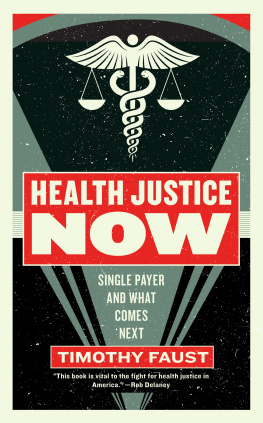
ALSO BY JEFFREY SIMPSON
Discipline of Power: The Conservative Interlude and the Liberal Restoration
Spoils of Power: The Politics of Patronage
Faultlines: Struggling for a Canadian Vision
The Anxious Years:
Politics in the Age of Mulroney and Chrtien
Star-Spangled Canadians:
Canadians Living the American Dream
The Friendly Dictatorship
Hot Air: Meeting Canadas Climate Change Challenge
(co-author)

WHY CANADAS HEALTH-CARE SYSTEM
NEEDS TO BE DRAGGED INTO
THE 21ST CENTURY

ALLEN LANE
an imprint of Penguin Canada
Published by the Penguin Group
Penguin Group (Canada), 90 Eglinton Avenue East, Suite 700,
Toronto, Ontario, Canada M4P 2Y3
Penguin Group (USA) Inc., 375 Hudson Street, New York, New York 10014, U.S.A.
Penguin Books Ltd, 80 Strand, London WC2R 0RL, England
Penguin Ireland, 25 St Stephens Green, Dublin 2, Ireland
(a division of Penguin Books Ltd)
Penguin Group (Australia), 250 Camberwell Road, Camberwell, Victoria 3124, Australia
(a division of Pearson Australia Group Pty Ltd)
Penguin Books India Pvt Ltd, 11 Community Centre, Panchsheel Park,
New Delhi 110 017, India
Penguin Group (NZ), 67 Apollo Drive, Rosedale, Auckland 0632, New Zealand
(a division of Pearson New Zealand Ltd)
Penguin Books (South Africa) (Pty) Ltd, 24 Sturdee Avenue, Rosebank,
Johannesburg 2196, South Africa
Penguin Books Ltd, Registered Offices: 80 Strand, London WC2R 0RL, England
First published 2012
1 2 3 4 5 6 7 8 9 10 (RRD)
Copyright Jeffrey Simpson, 2012
All rights reserved. Without limiting the rights under copyright reserved above, no part of this publication may be reproduced, stored in or introduced into a retrieval system, or transmitted in any form or by any means (electronic, mechanical, photocopying, recording or otherwise), without the prior written permission of both the copyright owner and the above publisher of this book.
Manufactured in the U.S.A.
LIBRARY AND ARCHIVES CANADA CATALOGUING IN PUBLICATION
Simpson, Jeffrey, 1949
Chronic condition : why Canadas health-care system needs to be dragged into the 21th century / Jeffrey Simpson.
Includes index.
ISBN 978-0-670-06589-9
1. Health care reformCanada. 2. Medical careCanada. 3. Medical policyCanada. 4. National health insuranceCanada. I. Title.
RA395.C3S55 2012 362.10971 C2012-903256-5
Visit the Penguin Canada website at www.penguin.ca
Special and corporate bulk purchase rates available; please see
www.penguin.ca/corporatesales or call 1-800-810-3104, ext. 2477.

For Wendy, Tait, Danielle and Brook
CONTENTS
INTRODUCTION
Medicare is the third rail of Canadian politics. Touch it and you die. Every politician knows this truth. Yes, politicians talk about health care, usually to promise more of it. Such talk is not part of a reasoned debate but essentially a bidding war. Many of them understand that a health-care system that costs about $200 billion a year in public and private money cannot continue as it is, that the system is inadequately structured for an aging population and has costs that grow faster than government revenues. Discussing these realities, however, risks shortening political careers.
Canadians embrace their public health-care system, medicare, more passionately than any other public program. Poll after poll has underscored their passion. Medicare has become a national icon that politicians dare not question. In public, they can only claim undying fidelity to medicare; in private, many of them acknowledge that it cannot continue as delivered, administered and financed, at least at current levels of taxation.
In 2009, Canadians spent 11.7 percent of their national income on health care. It is estimated that each year the health-care system is used about 400 million times by a population of 34 million. You might think that such an expensive and all-pervasive system would provoke people to think and politicians to talk about what needs to be done to preserve it. No such luck. The entrenched interests within the health-care system are so strong, the ideological prisms through which defenders observe the system so fixed, the publics embrace so passionate, its fears of change so pervasive and its aspirations for the system so contradictory that having an adult conversation seems next to impossible.
The French language and culture define the distinctiveness of Quebec. Elsewhere, health care reflects what Canadians believe to be one of their unique values: not to be American. Public-opinion polls asking Canadians how they differ from Americans place gun control and health care atop the list. Nowhere else in the world does public health care play such a defining role in shaping a national self-identity. In other countries, health care is a system, a program, a policy, unquestionably of considerable importance. In Canada, especially outside Quebec, health care is all these things and a great deal more.
Public policies in a democracy can be attacked and changed without citizens getting too upset about somehow losing their collective identity. Icons, however, have existential qualities that make them immune from serious debate. To question an icon is to probe something sacramental, definitional and deeply fundamental. When any Canadian wants to start a debate about the fundamentals of medicare, or even ask more modest but essential questions about whether the system can be sustained and by which means, the speaker risks being slapped down as somehow un-Canadian or wanting U.S.-style private health care.
Across the country, many elected officials and senior civil servants have looked at the costs of the system versus governments ability to keep paying for it at current levels of taxation. They understand that health care is devouring budgets, taking an increasing share of spending each year. They know that other government programs are suffering as more money gets shovelled into health care. In the past thirty-three years, health-care costs grew faster than the national economy nineteen times, at the same rate five times, and at a slower rate nine times. When medicare began, health care claimed 7 percent of the countrys economy; today it eats up 11.7 percent. According to a study for the C.D. Howe Institute by David Dodge, former governor of the Bank of Canada, deputy minister of finance and deputy minister of health, health care will consume 15.4 percent of the national economy in two decadesassuming huge efficiency gainsand 18.7 percent without them.
Dodges projections were roughly in line with those offered by the Organisation for Economic Co-operation and Development (OECD), which in 2010 looked ahead to 2050. An aging population will not cripple medicare, as some scaremongers have suggested. No grey tsunami threatens, but an aging population will unavoidably increase costs: for pharmaceuticals, long-term care facilities, home care and hospitals. Aging will mean fewer people not working compared with the number of those in the workforce, so the tax burden of the future will be more narrowly shared. Todays health-care deficits will become more burdensome for tomorrows generation unless we do something today.
Next page










